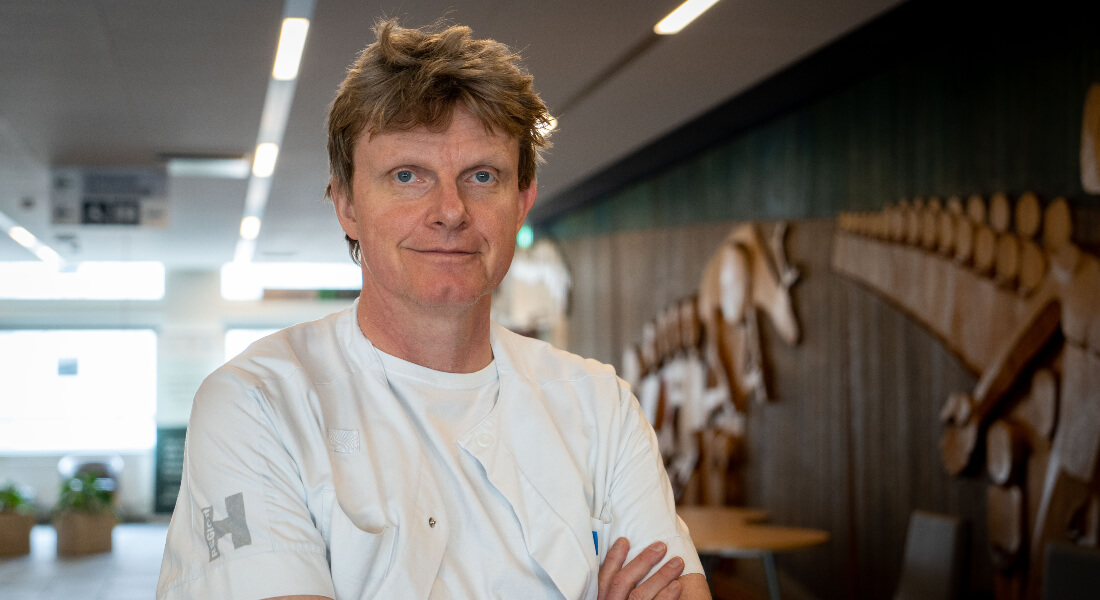“Start researching, even if it seems difficult. It is very rewarding”
It is both important as well as educational and vital to the patients that we do research. So says Clinical Professor and Chief Physician Mikkel Østergaard, who receives this year’s clinical KFJ Award, while Professor Ali Salanti receives the preclinical KFJ Award. With the award comes a cash prize of DKK 1.75 million for each award winner.

This year, two researchers from the Faculty of Health and Medical Sciences receive the prestigious KFJ Award that is awarded annually by the Kirsten and Freddy Johansen Foundation for unique contributions to i.e. medical science.
The preclinical award goes to Professor Ali Salanti from the Department of Immunology and Microbiology, while the clinical award goes to Mikkel Østergaard, Clinical Professor at the Department of Clinical Medicine and Chief Physician at Rigshospitalet.
With the award comes a cash prize of DKK 1.75 million.
We asked Mikkel Østergaard about his career and the people who have helped him become the leading researcher he is today.
What is your research about, and why is it important?
“My field of research is inflammatory joint disorders (inflammatory arthritis) focussing on rheumatoid arthritis, psoriatic arthritis and axial spondyloarthritis/ankylosing spondylitis. Two to three per cent of the population suffer from these disorders. The patients are often people of working age, and the disorders are both persistent (chronic) and a source of great pain, fatigue and functional impairment, and they are often, especially the latter two, diagnosed several years after onset. It is therefore crucial that we improve our ability to diagnose, monitor, prognosticate and treat these patients, which is what we are trying to do.”
When did you realise that you wanted to be a scientist?
“I have always believed in the importance of developing new knowledge of benefit to patients, even as a student. But I did not decide to become a researcher until a year after completing my master in medical science.”
When did you realise that you are a successful researcher?
“Well, what does successful mean? There are several stages. First, I was thrilled to be granted the funds for a PhD project and later that people in Denmark and abroad found my work interesting enough to be published in high-quality scientific journals and to be accepted first as a PhD thesis and later a doctoral thesis. Finally, I have thoroughly enjoyed contributing to and sometimes heading international and national collaborations and supervising young researchers and PhD students who also did a good job.”
Who has been your greatest source of inspiration as a researcher?
“The most important individual is without a doubt the late Professor and DMSc Ib Lorenzen, who was head of the Department of Rheumatology at Hvidovre Hospital. He was incredibly talented, logical and inspirational, and he supervised my work as a PhD student and later on. Subsequently, I have been inspired by lots of people from my great network, especially leading international professors of rheumatology Paul Emery from Leeds and Tore Kvien from Oslo, who have been a great support and partners for discussion in the international research environment. Last, but not least, I would like to mention my close cooperation partners first at Hvidovre Hospital and now Rigshospitalet in Glostrup, Merete Hetland and Lene Terslev, both professors, with whom I have exchanged ideas, debated problems and cooperated on various research projects.”
What has been the greatest challenge of your career?
“Overall, I think it has been a rather smooth process. Attracting research funding is always difficult, though. In fact, I think the last couple of years have been the most challenging due to legislation (the GDPR) and endlessly difficult processing/authorisation procedures, which have resulted in several delays and sometimes caused projects to be partially cancelled. I have felt bad both for the young PhD students who had looked forward to working on the projects and the patients who would have benefited from them. So besides the corona crisis, the main challenges have probably been the data protection regulation and jurists and others who did not really know how to interpret the new rules.”
What part of your career are you most proud of?
“I am proud of having established a large, well-functioning research unit of around 40 individuals who continue to deliver international-class research and who have built a really large international network of cooperation partners. I am also proud of having supervised around 40 PhD students, whom I hope and believe have learned something that will prove useful in their future work – of benefit to themselves and rheumatology patients.”
What would you say to someone who is thinking about becoming a researcher?
“I would say: Start researching, even if it seems difficult. It is very rewarding and educational for the researcher and vital to the field and patients’ well-being in the long term. It is important to find a talented and experienced supervisor or mentor. And then it is important to show dedication. You need to work hard, and finally, you should seek out collaboration and start building a network.”
